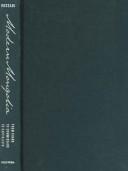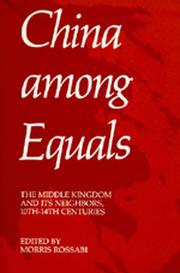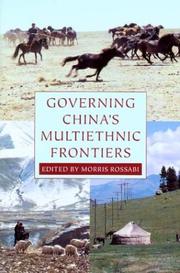| Listing 1 - 10 of 42 | << page >> |
Sort by
|
Book
ISBN: 9004281266 9789004281264 1322348901 9004285296 Year: 2014 Publisher: Leiden Brill
Abstract | Keywords | Export | Availability | Bookmark
 Loading...
Loading...Choose an application
- Reference Manager
- EndNote
- RefWorks (Direct export to RefWorks)
This wide-ranging work, consisting of selected essays of Morris Rossabi, reflects the diverse interests of a leading scholar of China and Inner Asia. It encompasses the eras from the thirteenth century to the present, territories stretching from China to Mongolia to Central Asia and to the Middle East, and religions from Islam to Nestorian Christianity to Judaism and Confucianism in East, Central, and West Asia. Rossabi first challenged the conventional wisdom concerning traditional Chinese foreign relations by showing the pragmatism of Chinese officials who were not bound by Confucian strictures and stereotypes about foreigners and were actually knowledgeable about neighboring regions. His studies of the territories surrounding China led to the discovery of a major omission in historical writing—the lack of a biography of Khubilai Khan, one of the most renowned rulers in Eurasian history. His biography of Khubilai resulted in further studies of the Mongolian legacy on global history and of the significant role of women in the Mongolian empire. His repeated travels in Mongolia, in turn, stimulated an interest in modern Mongolia, especially the turbulence following the turbulence after the collapse of socialism in 1990, a subject he writes about in this book. The need for greater public knowledge and awareness of China, Mongolia, Central Asia, the Silk Roads, and Islam in Asia prompted Rossabi to write general, occasionally pedagogical, articles about these topics for a wider audience.
China --- Mongolia --- Chine --- Mongolie --- History --- Foreign relations --- Histoire --- Relations extérieures --- S04/0400 --- S09/0402 --- S04/0660 --- S04/0670 --- S23/0525 --- S11/1221 --- S11/1220 --- S03/0450 --- China: History--General works: China --- China: Foreign relations and world politics--China and Central Asia --- China: History--Yuan: .... - 1368 --- China: History--Ming: 1368 - 1644 --- Mongolia and the Mongols (including Tannu Tuva, Buriats)--Mongolian history: since 1368 --- China: Social sciences--Jews --- China: Social sciences--Mohammedans (if treated as a special ethnic group) --- China: Geography, description and travel--Silk route --- Relations extérieures --- Yuan Dynasty (China) --- 1260 - 1368 --- China. --- Mongolia. --- BNMAU --- Bu̇gd Naĭramdakh Mongol Ard Uls --- Bu̇gd Naĭramdakh Mongol Ard Ulsyn --- Bügd Nayramdah Mongol Ard Uls --- Gaimōko --- Meng-ku --- Meng-ku jen min kung ho kuo --- Menggu --- Menggu ren min gong he guo --- MNR --- Mōko Jinmin Kyōwakoku --- Mongġol --- Mongġol Ulus --- Mongol Népköztársaság --- Mongol Uls --- Mongolei --- Mongolian People's Republic --- Mongolian Republic --- Mongoliet --- Mongolii͡ --- Mongolische Volksrepublik --- Mongolʹskai͡a narodnai͡a respublika --- Mongoru --- Mongoru Jimmin Kyōwakoku --- Mongoru Jinmin Kyōwakoku --- Outer Mongolia --- République populaire de Mongolie --- Wai Meng-ku --- 1949 --- -BNKhAU --- Bu̇gd Naĭramdakh Dundad Ard Uls --- Bu̇gu̇de Nayiramdaqu Dumdadu Arad Ulus --- Bu̇gu̇de Nayiramdaxu Dundadu Arad Ulus --- Catay --- Cathay --- Central Government of the People's Republic of China --- Central People's Government of Communist China --- Chinese National Government --- Chinese People's Republic --- Chūka Jinmin Kyōwakoku --- Chung-hua chung yang jen min kung ho kuo --- Chung-hua jen min kung ho kuo --- Chung-hua min kuo --- Chung-kuo --- Chung-kuo kuo min cheng fu --- Chung yang jen min cheng fu --- Cina --- Činská lidová republika --- Dumdad Uls --- Dumdadu Ulus --- Erets Sin --- Jhonggu --- Jumhūriyat al-Ṣīn al-Shaʻbīyah --- Khi͡atad --- Kínai Népköztársaság --- Kin --- Kitad --- Kita --- Kitaĭskai͡a Narodnai͡a Respublika --- Kitajska --- KNR --- Kytaĭsʹka Narodna Respublika --- National Government --- P.R.C. --- P.R. China --- People's Republic of China --- PR China --- PRC --- Republic --- Republic of China --- República Popular China --- Republik Rakjat Tiongkok --- République Populaire de Chine --- RRC --- RRT --- Sāthāranarat Prachāchon Čhīn --- VR China --- VRChina --- Zhong guo --- Zhong hua ren min gong he guo --- Zhongguo --- Zhonghua Renmin Gongheguo --- Zhonghuaminguo --- History.

ISBN: 1597347590 1282358081 9786612358081 0520938623 1417585048 9780520938625 0520243994 9780520243996 0520244192 9780520244191 9781597347594 9781417585045 9781282358089 6612358084 Year: 2005 Publisher: Berkeley : University of California Press,
Abstract | Keywords | Export | Availability | Bookmark
 Loading...
Loading...Choose an application
- Reference Manager
- EndNote
- RefWorks (Direct export to RefWorks)
Land-locked between its giant neighbors, Russia and China, Mongolia was the first Asian country to adopt communism and the first to abandon it. When the Soviet Union collapsed in the early 1990's, Mongolia turned to international financial agencies-including the International Monetary Fund, the World Bank, and the Asian Development Bank-for help in compensating for the economic changes caused by disruptions in the communist world. Modern Mongolia is the best-informed and most thorough account to date of the political economy of Mongolia during the past decade. In it, Morris Rossabi explores the effects of the withdrawal of Soviet assistance, the role of international financial agencies in supporting a pure market economy, and the ways that new policies have led to greater political freedom but also to unemployment, poverty, increasingly inequitable distribution of income, and deterioration in the education, health, and well-being of Mongolian society. Rossabi demonstrates that the agencies providing grants and loans insisted on Mongolia's adherence to a set of policies that did not generally take into account the country's unique heritage and society. Though the sale of state assets, minimalist government, liberalization of trade and prices, a balanced budget, and austerity were supposed to yield marked economic growth, Mongolia-the world's fifth-largest per capita recipient of foreign aid-did not recover as expected. As he details this painful transition from a collective to a capitalist economy, Rossabi also analyzes the cultural effects of the sudden opening of Mongolia to democracy. He looks at the broader implications of Mongolia's international situation and considers its future, particularly in relation to China.
HistoryzMongolia. --- Mongolia - History - 1990-. --- Regions & Countries - Asia & the Middle East --- History & Archaeology --- East Asia --- Mongolia --- History --- History. --- HISTORY / Asia / General. --- Mongolie --- Economic conditions --- Histoire --- Conditions économiques --- asia scholars. --- asian studies. --- business and industry. --- capitalism. --- capitalist society. --- china. --- civic. --- commissars. --- communism. --- economic growth. --- economic history. --- foreign aid. --- history. --- international financial agencies. --- international relations. --- khans. --- minimalist government. --- modern history. --- money. --- mongolia. --- mongolian history. --- mongolian society. --- political history. --- political science. --- poverty. --- pure market economy. --- retrospective. --- russia. --- soviet union.

ISBN: 0520045629 0520043839 Year: 1983 Publisher: Berkeley University of California Press
Abstract | Keywords | Export | Availability | Bookmark
 Loading...
Loading...Choose an application
- Reference Manager
- EndNote
- RefWorks (Direct export to RefWorks)
China --- Foreign relations --- History. --- History --- S09/0200 --- S04/0310 --- China: Foreign relations and world politics--General works and before 1840 --- China: History--Collections of articles, general
Book
ISBN: 0520059131 Year: 1988 Publisher: Berkeley University of California press
Abstract | Keywords | Export | Availability | Bookmark
 Loading...
Loading...Choose an application
- Reference Manager
- EndNote
- RefWorks (Direct export to RefWorks)
Book
ISBN: 0876637160 Year: 1975 Publisher: New York (N.Y.): Pica press
Abstract | Keywords | Export | Availability | Bookmark
 Loading...
Loading...Choose an application
- Reference Manager
- EndNote
- RefWorks (Direct export to RefWorks)
S09/0402 --- S09/0506 --- S23/0550 --- S23/0660 --- S24/0500 --- S32/0500 --- #SML: Henry Serruys --- China: Foreign relations and world politics--China and Central Asia --- China: Foreign relations and world politics--China and Russia --- Mongolia and the Mongols (including Tannu Tuva, Buriats)--General history of Mongolia: after 1911 (both Inner and Outer Mongolia) --- Mongolia and the Mongols (including Tannu Tuva, Buriats)--Mongolian relations with China --- Tibet--History (incl. Relations with China and England) --- Central Asia--History (incl. Huns, Turkish people etc.) --- Asia, Central --- China --- Central Asia --- Soviet Central Asia --- Tūrān --- Turkestan --- West Turkestan --- Asia --- Relations --- -Relations --- -S09/0402 --- Cina --- Kinë --- Cathay --- Chinese National Government --- Chung-kuo kuo min cheng fu --- Republic of China (1912-1949) --- Kuo min cheng fu (China : 1912-1949) --- Chung-hua min kuo (1912-1949) --- Kina (China) --- National Government (1912-1949) --- China (Republic : 1912-1949) --- People's Republic of China --- Chinese People's Republic --- Chung-hua jen min kung ho kuo --- Central People's Government of Communist China --- Chung yang jen min cheng fu --- Chung-hua chung yang jen min kung ho kuo --- Central Government of the People's Republic of China --- Zhonghua Renmin Gongheguo --- Zhong hua ren min gong he guo --- Kitaĭskai︠a︡ Narodnai︠a︡ Respublika --- Činská lidová republika --- RRT --- Republik Rakjat Tiongkok --- KNR --- Kytaĭsʹka Narodna Respublika --- Jumhūriyat al-Ṣīn al-Shaʻbīyah --- RRC --- Kitaĭ --- Kínai Népköztársaság --- Chūka Jinmin Kyōwakoku --- Erets Sin --- Sin --- Sāthāranarat Prachāchon Čhīn --- P.R. China --- PR China --- Chung-kuo --- Zhongguo --- Zhonghuaminguo (1912-1949) --- Zhong guo --- Chine --- République Populaire de Chine --- República Popular China --- Catay --- VR China --- VRChina --- 中國 --- 中国 --- 中华人民共和国 --- Jhongguó --- Bu̇gu̇de Nayiramdaxu Dundadu Arad Ulus --- Bu̇gu̇de Nayiramdaqu Dumdadu Arad Ulus --- Bu̇gd Naĭramdakh Dundad Ard Uls --- Khi︠a︡tad --- Kitad --- Dumdadu Ulus --- Dumdad Uls --- Думдад Улс --- Kitajska --- -#SML: Henry Serruys --- China (Republic : 1949- ) --- PRC --- P.R.C. --- BNKhAU --- БНХАУ
Book
ISBN: 9789004343382 Year: 2017 Publisher: Leiden ; Boston : Brill,
Abstract | Keywords | Export | Availability | Bookmark
 Loading...
Loading...Choose an application
- Reference Manager
- EndNote
- RefWorks (Direct export to RefWorks)
"The essays in this volume dispel some of the myths concerning the Mongolians and other Inner Asian peoples. This remarkable volume edited by and dedicated to Morris Rossabi challenges the depictions of these mostly nomadic pastoral groups as barbaric plunderers and killers while not denying the destruction and loss of life they engendered. Several essays pioneer in consulting Mongolian and other Inner Asian rather than exclusively Chinese and Persian sources, offering new and different perspectives. Such research reveals the divisions among the Mongolians, which weakened them and led to the collapse of their empire. Two essays dispel myths about modern Mongolia and reveal the country's significance, even in an era of superpowers, two of which surround it. Contributors are: Christopher Atwood, Bettine Birge, Michael Brose, Pamela Crossley, Johan Elverskog, Jargalsaikhan Enkhsaikhan, Yuki Konagaya, James Millward, David Morgan, and David Robinson"--Provided by publisher.
Mongols --- Law --- History. --- Warfare. --- Histoire --- Mongolia --- Mongolie --- Social life and customs. --- History, Military. --- Relations. --- Social conditions. --- Histoire militaire --- Conditions sociales --- Warfare --- History --- Guerre --- Moeurs et coutumes --- Relations

ISBN: 029580405X 9780295804057 0295983906 9780295983905 9780295984124 0295984120 Year: 2004 Publisher: Seattle University of Washington press
Abstract | Keywords | Export | Availability | Bookmark
 Loading...
Loading...Choose an application
- Reference Manager
- EndNote
- RefWorks (Direct export to RefWorks)
Upon coming to power in 1949, the Chinese Communist government proclaimed that its stance toward ethnic minorities--who comprise approximatelyeight percent of China’s population--differed from that of previous regimes and that it would help preserve the linguistic and cultural heritage of the fifty-five official "minority nationalities." However, minority culture suffered widespread destruction in the early decades of the People’s Republic of China, and minority areas still lag far behind Han (majority) areas economically.Since the mid-1990s, both domestic and foreign developments have refocused government attention on the inhabitants of China’s minority regions, their relationship to the Chinese state, and their foreign ties. Intense economic development of and Han settlement in China’s remote minority regions threaten to displace indigenous populations, post-Soviet establishment of independent countries composed mainly of Muslim and Turkic-speaking peoples presents questions for related groups in China, freedom of Mongolia from Soviet control raises the specter of a pan-Mongolian movement encompassing Chinese Mongols, and international groups press for a more autonomous or even independent Tibet.In Governing China’s Multiethnic Frontiers, leading scholars examine the Chinese government’s administration of its ethnic minority regions, particularly border areas where ethnicity is at times a volatile issue and where separatist movements are feared. Seven essays focus on the Muslim Hui, multiethnic southwest China, Inner Mongolia, Xinjiang, and Tibet. Together these studies provide an overview of government relations with key minority populations, against which one can view evolving dialogues and disputes.
Minorities --- Government policy --- China --- Ethnic relations --- Political aspects --- Ethnic minorities --- Foreign population --- Minority groups --- Cina --- Kinë --- Cathay --- Chinese National Government --- Chung-kuo kuo min cheng fu --- Republic of China (1912-1949) --- Kuo min cheng fu (China : 1912-1949) --- Chung-hua min kuo (1912-1949) --- Kina (China) --- National Government (1912-1949) --- China (Republic : 1912-1949) --- People's Republic of China --- Chinese People's Republic --- Chung-hua jen min kung ho kuo --- Central People's Government of Communist China --- Chung yang jen min cheng fu --- Chung-hua chung yang jen min kung ho kuo --- Central Government of the People's Republic of China --- Zhonghua Renmin Gongheguo --- Zhong hua ren min gong he guo --- Kitaĭskai︠a︡ Narodnai︠a︡ Respublika --- Činská lidová republika --- RRT --- Republik Rakjat Tiongkok --- KNR --- Kytaĭsʹka Narodna Respublika --- Jumhūriyat al-Ṣīn al-Shaʻbīyah --- RRC --- Kitaĭ --- Kínai Népköztársaság --- Chūka Jinmin Kyōwakoku --- Erets Sin --- Sin --- Sāthāranarat Prachāchon Čhīn --- P.R. China --- PR China --- Chung-kuo --- Zhongguo --- Zhonghuaminguo (1912-1949) --- Zhong guo --- Chine --- République Populaire de Chine --- República Popular China --- Catay --- VR China --- VRChina --- 中國 --- Jhongguó --- Bu̇gu̇de Nayiramdaxu Dundadu Arad Ulus --- Bu̇gu̇de Nayiramdaqu Dumdadu Arad Ulus --- Bu̇gd Naĭramdakh Dundad Ard Uls --- Khi︠a︡tad --- Kitad --- Dumdadu Ulus --- Dumdad Uls --- Думдад Улс --- Kitajska --- 中国 --- 中华人民共和国 --- Persons --- Assimilation (Sociology) --- Discrimination --- Majorities --- Plebiscite --- Race relations --- Segregation --- China (Republic : 1949- ) --- Political aspects. --- S23/0660 --- S24/0500 --- S25/0200 --- S25/0655 --- Mongolia and the Mongols (including Tannu Tuva, Buriats)--Mongolian relations with China --- Tibet--History (incl. Relations with China and England) --- Xinjiang--General works --- Xinjiang--Relations with China --- PRC --- P.R.C. --- BNKhAU --- БНХАУ --- Politics & government
Book
ISBN: 4770016506 Year: 1992 Publisher: Tokyo Kodansha international
Abstract | Keywords | Export | Availability | Bookmark
 Loading...
Loading...Choose an application
- Reference Manager
- EndNote
- RefWorks (Direct export to RefWorks)
Diplomats --- Travel, Medieval. --- Voyages and travels. --- Travel. --- Travel, Medieval --- Voyages and travels --- #SML: Chinese memorial library --- S09/0495 --- S23/0680 --- S32/0300 --- Journeys --- Travel books --- Travels --- Trips --- Geography --- Adventure and adventurers --- Travel --- Travelers --- Civilization, Medieval --- Statesmen --- China: Foreign relations and world politics--China and Europe --- Mongolia and the Mongols (including Tannu Tuva, Buriats)--Mongolian relations with Europe --- Central Asia--Geography, description and travel --- Ṣâuma, Rabban,
Book
ISBN: 9780199840892 Year: 2012 Publisher: Oxford University Press
Abstract | Keywords | Export | Availability | Bookmark
 Loading...
Loading...Choose an application
- Reference Manager
- EndNote
- RefWorks (Direct export to RefWorks)
Mongols --- S23/0500 --- History --- Mongolia and the Mongols (including Tannu Tuva, Buriats)--History: general and before 1911 --- eu-geor 940 --- cultuurgeschiedenis --- Rusland
Book
ISBN: 9781557860781 9781577181132 Year: 2013 Publisher: Malden (Mass.) : John Wiley and Sons,
Abstract | Keywords | Export | Availability | Bookmark
 Loading...
Loading...Choose an application
- Reference Manager
- EndNote
- RefWorks (Direct export to RefWorks)
| Listing 1 - 10 of 42 | << page >> |
Sort by
|

 Search
Search Feedback
Feedback About UniCat
About UniCat  Help
Help News
News